How To Draw A Frame In Photoshop
Learn how to add together a simple photograph border, and fifty-fifty ii borders, around your image with Photoshop! A step-by-pace tutorial for Photoshop CC, CS6 and earlier.
Photograph borders are a swell style to add a sense of course and elegance to an image. And calculation a edge is easy in one case yous know the steps. We'll start past adding more space around the image using Photoshop'due south Sheet Size command. And then, to create the border, we'll fill the space with color using a Solid Color fill layer. Yous'll larn how to choose a color for the edge from the Colour Picker, and how to blend the border with your photo by choosing a color directly from the paradigm itself!
In one case nosotros've added the main photograph border, I'll evidence y'all how to add a second, smaller border effectually the paradigm using a layer outcome.
I'll employ this image that I downloaded from Adobe Stock:
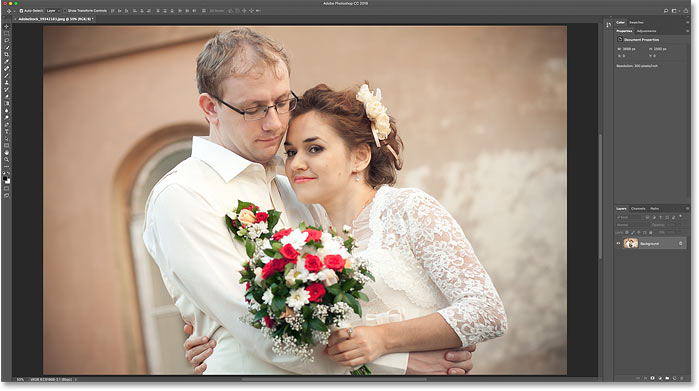
The original prototype. Credit: Adobe Stock.
And here'southward the image with the photograph edge around it. You'll learn how to customize the size and colors of the edge as we work through the steps:
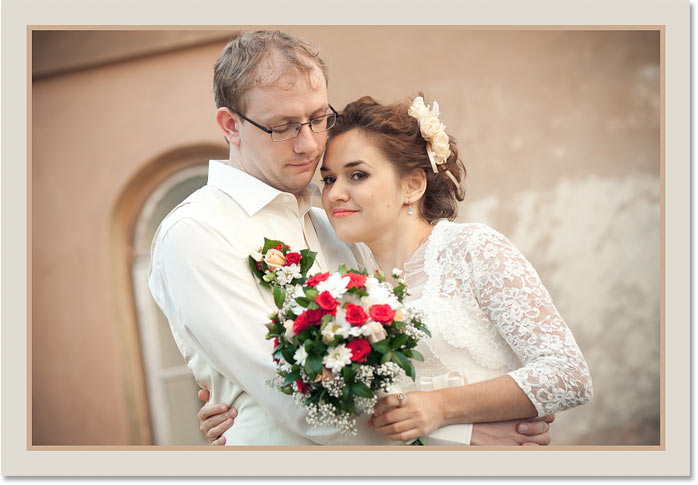
The photo border upshot.
Permit'south get started!
How to create a photograph edge in Photoshop
For this tutorial, I'm using Photoshop CC only any recent version of Photoshop volition work. You tin can also follow forth with my video of this tutorial on our YouTube channel. Or download this tutorial equally a print-ready PDF!
Step 1: Zoom out to make room for the border
To create the photo border, we'll be calculation more canvas space around the paradigm. Then lets give ourselves more room to work by zooming out. To zoom out from your keyboard, press and agree the Ctrl key on a Windows PC, or the Command central on a Mac, and press the minus cardinal. This gives us more room to meet the border:
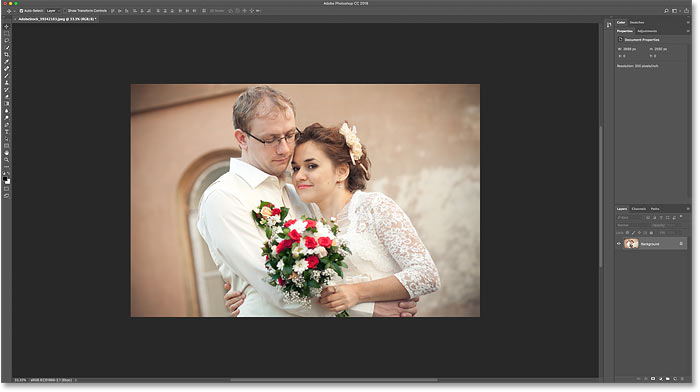
Zooming out from the image to brand room for the photo border.
Pace 2: Unlock the Background layer
If we look in the Layers panel, we see the prototype on the Background layer:
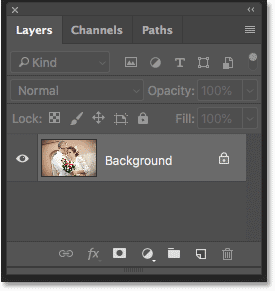
The Layers panel showing the epitome on the Background layer.
We need to unlock the Groundwork layer so nosotros can add other layers below it. To unlock it, in Photoshop CC, simply click the lock icon. In CS6 or before, press and agree the Alt (Win) / Option (Mac) key on your keyboard and double-click. This removes the lock icon and renames the layer to "Layer 0":
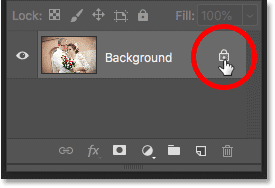
Unlocking the Background layer.
Step 3: Open the Sail Size dialog box
To add more sheet infinite around the paradigm, get up to the Image menu in the Menu Bar and cull Canvas Size:
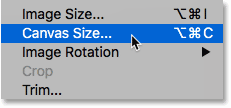
Going to Prototype > Canvas Size.
Stride 4: Add more canvas around the photograph
In the Canvass Size dialog box, make sure that the Relative option is checked. And so, in the Anchor grid, make sure that the center foursquare is selected. This will add the new canvas space every bit around the epitome:
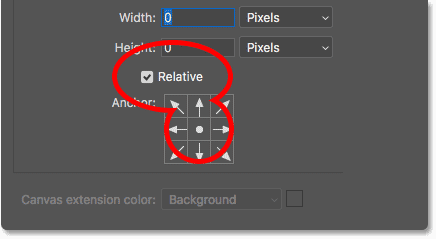
Make sure Relative and the center square are selected.
So, enter the size you need for your photo border into the Width and Height fields. Keep in mind that the value you enter volition be divided equally between both sides. And that'southward true for both the width and the height. So if yous want a quarter-inch border around the image, you'll actually want to enter 0.five inches for the Width and Height. For a 1-inch border, you'll need to enter 2 inches. In other words, whatever size y'all need, enter twice that amount.
In my case, I want a one-half-inch border, so I'll set both the Width and Height to twice that amount, or i inch:
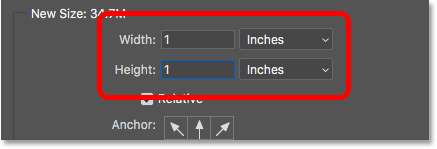
Enter twice the size you demand into the Width and Height boxes.
Then, to add together the sail space, click OK to close the dialog box. And here we come across the new canvas around the epitome. The checkerboard pattern means that the space is currently filled with transparency, but we'll add color to it side by side:
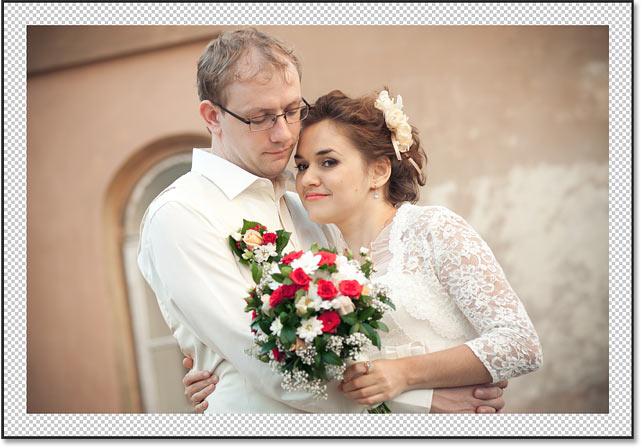
The new sail space that will become the photograph border.
How to undo the canvas size and effort over again
If you chose the incorrect size for your border, y'all tin can undo information technology by going up to the Edit bill of fare and choosing Undo Canvas Size. And so re-open the Canvas Size dialog box (go to Epitome > Canvas Size) and try again:

Going to Edit > Disengage Canvass Size.
Step five: Add together a Solid Color fill layer
To fill the border with a color, we'll use one of Photoshop'south Solid Color fill layers. In the Layers panel, click the New Fill or Adjustment Layer icon at the bottom:
Clicking the New Fill or Aligning Layer icon.
Then choose Solid Color from the list:
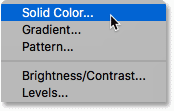
Adding a Solid Colour fill up layer.
Step 6: Choose white for the colour of the photo border
In the Color Picker, choose the color you lot want for your edge. I'll choose white for now, but I'll show you how to modify the color in a moment:
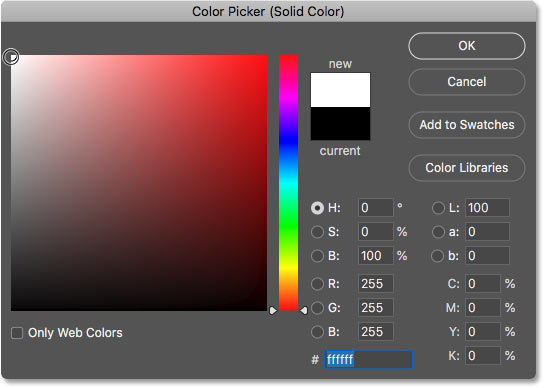
Choosing white in the Color Picker.
Click OK when you're washed to close the Colour Picker. And Photoshop temporarily fills the entire certificate with white, blocking the image from view:

The make full layer blocks the image from view.
Footstep 7: Elevate the make full layer beneath the epitome
To ready that, back in the Layers panel, click and elevate the fill layer beneath the image:
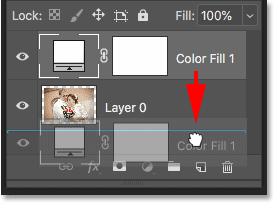
Dragging the fill layer below "Layer 0".
And now the color from the fill layer appears only inside the border:
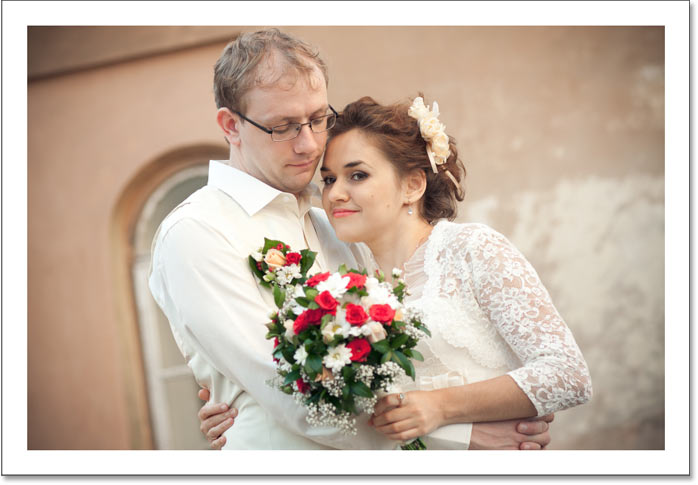
The initial photograph border issue.
Footstep 8: Change the border color (optional)
If you lot want something other than white, you tin can choose a different color for your edge by double-clicking on the fill up layer's color swatch:
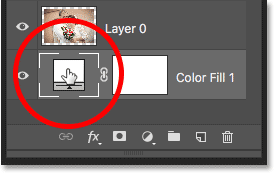
Double-clicking on the color swatch in the Layers panel.
This re-opens the Colour Picker where you can choose something different. And as y'all try dissimilar colors, you'll see a alive preview of the new color around the image. So if I cull black instead of white:
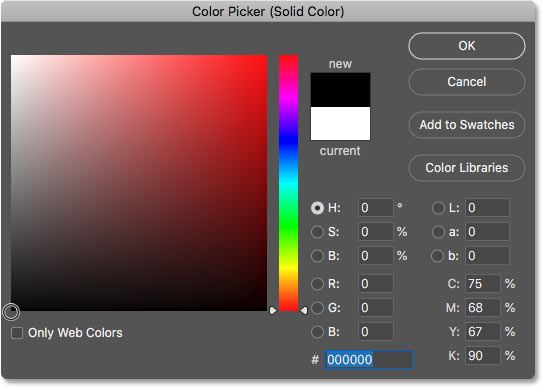
Choosing black in the Colour Picker.
Then my border instantly changes to black:
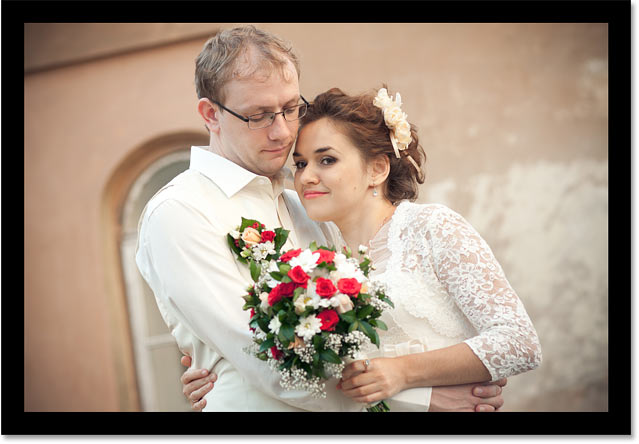
The aforementioned border, now in black.
How to choose a edge color from the prototype
Yous can choose any color you like from the Color Picker. Or, you can choose a color straight from the paradigm itself. Only movement your cursor into the image and click on the color y'all need. I'll cull a lite gray from the window in the background:
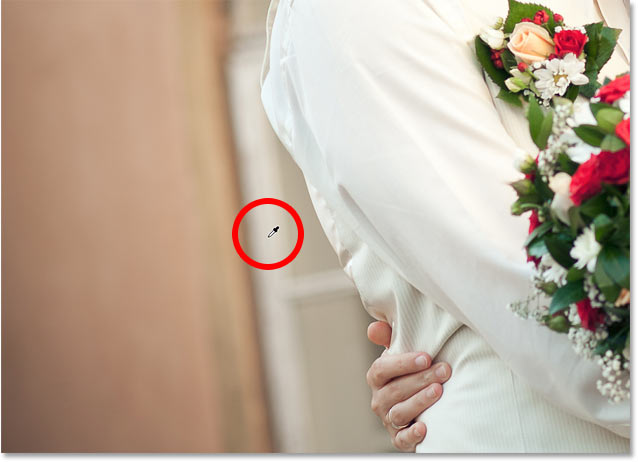
Choosing a photo border color from the image.
And again, the border instantly changes to the new colour. To accept it, click OK to close the Colour Picker:
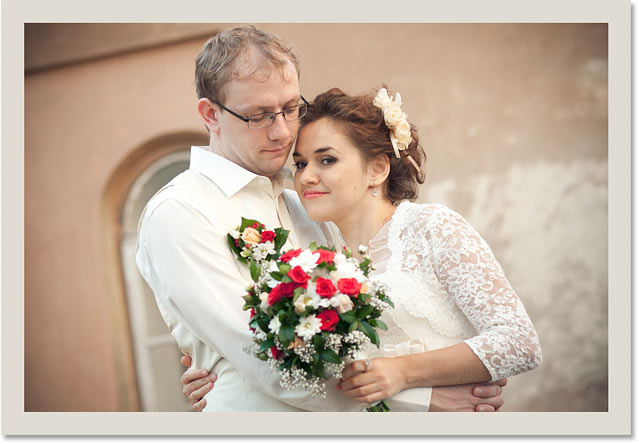
The photo border now blends improve with the prototype.
Calculation a smaller border inside the master border
Now that we've added the main border, permit'southward add a second, smaller border inside the main one. And nosotros'll exercise that using a layer effect.
Step 9: Select "Layer 0"
In the Layers console, select the paradigm on "Layer 0":
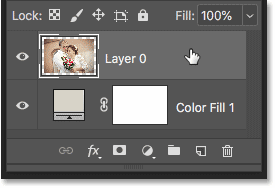
Clicking on the image layer to select it.
Stride x: Add together a Stroke layer style
Then click the Layer Styles icon (the "fx" icon):
Clicking the "fx" icon in the Layers panel.
And choose Stroke from the list:
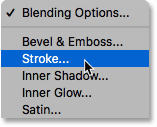
Choosing a Stroke layer result.
In the Layer Mode dialog box, go out the stroke color set to blackness for now, and make certain that the Position is set to Inside. Then, increment the width of the stroke past dragging the Size slider:
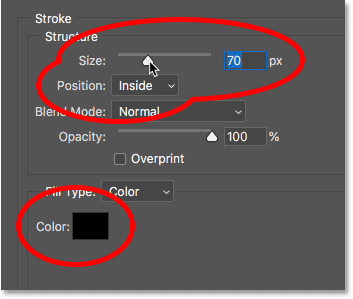
The Stroke options.
As you elevate, you'll see the size of the stroke increasing around the within of the main border:
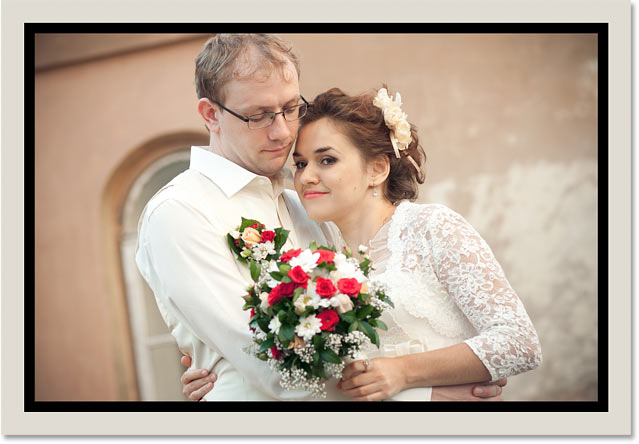
The stroke appears between the photo and the edge.
Step 11: Change the colour of the stroke (optional)
If you don't want black equally your stroke color, you can alter it past clicking the color swatch:
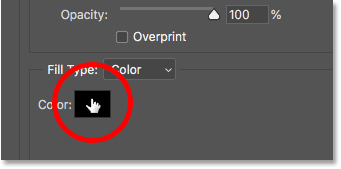
Clicking the stroke'southward color swatch.
Then, in the Colour Picker, choose a different color. Or, simply like we did for the primary border, yous can choose a color directly from your epitome. I'll click on a color from the background:
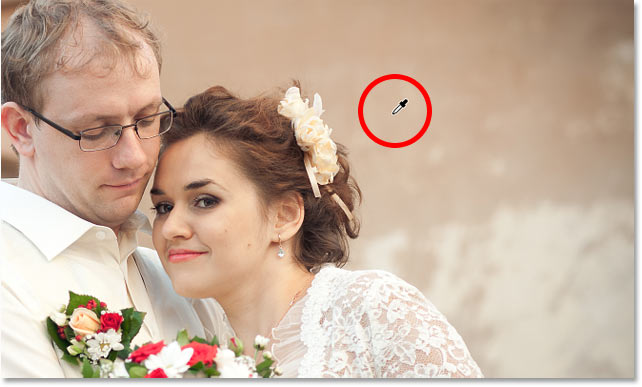
Choosing a color for the stroke from the paradigm.
And the stroke instantly updates to the new colour. When you're happy with the colour, click OK to shut the Color Picker:
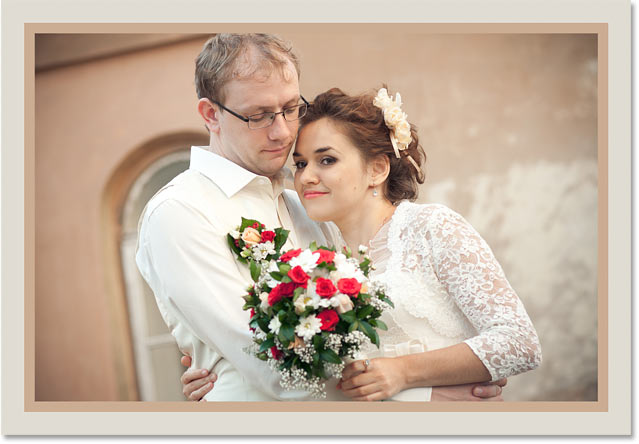
Both the edge and the stroke now utilise colors from the image.
Stride 12: Adjust the size of the stroke
Finally, I'll terminate off the result by adjusting the Size slider to fine-melody the thickness of the stroke. I'thou using a fairly large epitome here so I'll become with a Size value of around 32px. Then to accept it, I'll click OK to close the Layer Style dialog box:
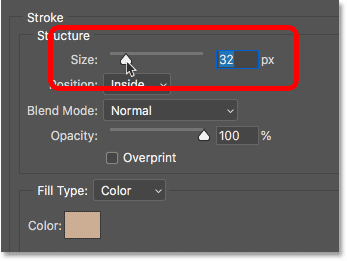
Fine-tuning the size of the stroke.
And hither's my final result:

The final "photo edge" result.
And there nosotros take it! That's how easy it is to add a border effectually your photos with Photoshop! For more photo border effects, check out my drop shadow photo border and my picture frame tutorials, as well as my tutorial on how to create a painted edges border. Or visit my Photo Effects department for more tutorials! And don't forget, all of our tutorials are now available to download every bit PDFs!
Source: https://www.photoshopessentials.com/photo-effects/borders-and-frames/simple-solid-color-border/
Posted by: alanizthates.blogspot.com


0 Response to "How To Draw A Frame In Photoshop"
Post a Comment